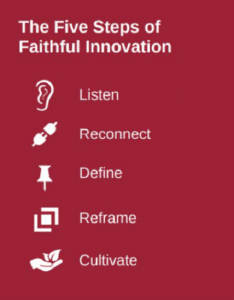A book for structure
In my reading about rural ministry, leadership and faithful innovation since becoming the Director of Rural Ministry at Luther Seminary, I have read many books. Some are helpful. Some are not.
One book that still stands out from the past, which I re-read, is a book from over twenty years ago, called Discovering Hope: Building Vitality in Rural Congregations. In my leadership in a rural synod, this is a book that I would suggest to congregational leaders for personal reading or communal reading in a leadership team like the council. People found it helpful. When I read it recently, I found it is still helpful today. I was surprised by hope for small town and rural congregations and the people who call them home.
The book is built around a simple recipe of faith practices, best practices from rural congregations, and simple planning each chapter provokes. The book was written by L. Shannon Jung and David Poling Goldene.
The faith practices elevated are….
- Prayer: Letting Go and Letting God
- Worship: Building Community and Hope
- Discipleship: Learning to Live Jesus Way
- Evangelism: A Way of Life
- Caring Ministries: Serving as Jesus Served
- Leadership: Who is Driving the Tractor
- Context: Discovering the Gift of Place
It is still available through Augsburg Fortress and other online booksellers.
Re-discovering hope
Perhaps you are needing to re-discover hope in this time where we are worn out from waves of viruses and the tender and ragged emotions that it sets loose in us, our congregations and our communities. Even if you don’t read the book, you could benefit from its structure which in broad strokes creates a sketch for you to paint with your own decisions in your local context.
Faith practices
First, it begins lifting up simple but powerful faith practices. The list could be longer. Faith practices are gifts from God and the Church before us.
In recent days the Episcopal Church and Presiding Bishop Curry have put together a different list. “The Way of Love” is an intriguing project that can also be used by all Christian traditions.
In my parish ministry and synod ministry, I found that inviting people into God’s gift of faith practices could speak to people across the generations. It also united us as a community by giving us a focus of discipleship. God’s gift of faith practices sustain and pass on faith.
A variety of faith practices remind us that our congregation is about more than attending worship. We are called and sent to be Christ-followers. Our congregations exist to serve as a social network to grow, sustain and send gracious Christ followers into their daily baptismal ministry of their households, communities, workplaces and God’s world. They stretch us deep and wide in our daily life of faith. They create space to innovate and explore how we might follow and serve Christ’s mission now.
Best practices
What can you learn from your neighbors, congregations or leaders you respect? Faithful innovation begins with listening, noticing and learning. Field trips or Zoom conversations with congregations where God has given and developed gifts can be a better teacher than a book or a lecture. In our local lives and congregations we do best when we begin with the assets God has given us and the experiences that God has blessed us with. Exploring ministry practices in similar and different congregations can create rich fruit. God also redeems broken-ness like God redeemed the pain and suffering of the cross. God creates splints when we are spiritually broken, so that God can bring Christ’s healing and redemptive work to our life and lives.
Simple planning
We often fail to plan. Or we drive into the other ditch of doing such an intense, thick planning process that what we plan lives only in a report that is rarely referenced or used. Some of us are old enough to remember the days before power steering in cars or tractors. To turn a big machine, it was better to start moving (a simple plan) and then it was easier to steer where you wanted to go (pursuing big goals and smaller steps or objectives) once you were moving. Simple goals implemented and objectives achieved also motivate us as individuals and communities to move forward further and follow Christ in our congregations and contexts.
There are other simple tools that can help build usable but focused plans. One is built around the acronym SOAR. Another, SWOT analysis looks at Strengths, Weaknesses, Opportunities and Threats. I don’t know about you but I usually end up having the threats holding my attention. SOAR is an acronym that invites you to instead think about Strengths, Opportunities, Aspirations and Results. You can make it as complex as you need it to be for your community of faith’s situation. It challenges you to think about the results or outcomes you would like to see. It is built off a simple book, Learning to SOAR: Creating Strategy that Inspires Innovation and Engagement (https://www.soar-strategy.com/what-is-soar). Planning and then acting on your goals and objectives is encouraging and builds a sustaining practice of communal discernment and deciding. The work of planning together generates hope and focus.
Are you stuck?
We had a flash freeze of melted snow followed by about five inches of fluffy snow a few weeks ago. My neighbors across the street kept getting stuck as they tried to clear their apartment’s parking lot before the snow plow came. When it was clear that their cars and their tactics were not making headway, I would go to the garage, grab a shovel and pick up my pail of granite chips. The little granite grit chips were really the secret more than the shoveling. Though small, those stone chips created enough traction that the cars could get going and the drivers would reduce their futile attempts to force their way out with more tire spinning. They also were able to get moving and get to where they needed to park. God’s Spirit shows up like that in our life when we are short of hope and flustered by what is or is not happening in our lives or our communities of faith. What makes the difference can be relatively small but give us the traction we need to move forward.
If you serve in a small town and rural congregation Discovering Hope: Building Vitality in Congregations could provide the structure that helps you get going in your own leadership or stimulates the community of faith’s leadership.
Faithful Innovation gives me hope as well. It is built around these five steps. Digging into Faithful Innovation is something that a lot of people are doing in their life, their congregation’s life and their regional church’s life. Faith+Lead is a place to learn more about the Faithful Innovation Framework through blog posts, podcasts, events, courses and learning communities.
Centering Christ Jesus
Our world wants to pull us apart with all kinds of callings. Most congregations, pastors and ministers are trying to do too much. One of my colleagues when I served as a bishop, Marcus Lohrmann, argued repeatedly to keep the cross and Christ at the center. He was right. Christ Jesus reminds us that our efforts are not the center but God’s work and grace are. The cross also reminds us of God’s resurrecting love and grace.
The ancient church had different lists of the marks of the church. But one of those lists boiled down the life in Christ’s community to these four words and callings. It would be another structure you could use to plan and explore innovations while growing deeper into the gifts previous generations of God’s people have used to balance out their life together in different seasons of God’s Church.
Koinonia – We are called to grow deeper and wider in the community of Christ and engage our communities.
Kerygma – We are called to proclaim the Good News through Word and sacraments. We speak by what we say and do the Good News.
Diidakai – We are called to pass on the faith to others and encourage one another as we work out what it means to follow Jesus in this time and place.
Diakonia – We are called to serve people in our community of faith and called to care for people in our community, region, country and world.
Trusting God will provide
Keep your eyes open for what God is up to in your midst. This past month I led a group of seminarians in an independent study course. As they read and then did research about rural congregations and communities, I was surprised by how their curiosity, wisdom and insights gave me hope. Pray that God will help you see the new leaders (younger and older) you are called to walk with encouraging them as they grow and develop.
We have a trustworthy God. Jesus trusted the early disciples even though they could be “duh-ciples” like we too often are as well. In spite of our confusion and broken-ness, God trusts you and continues to support and encourage you. Jesus promised and sends God’s Spirit to plant and cultivate our faith and guide our ministry.
May you re-discover hope as you follow Jesus into Christ’s “preferred and promised future”.
============
What are you reading or discovering gives you hope? Who is God using to give you hope?
What is God up to in your life or your community of faith’s life that is giving you hope?
When have you seen the fruit of another lightweight but usable form of planning?





